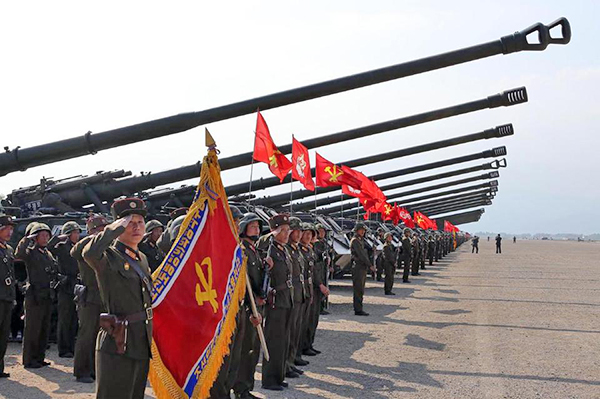Class News
Lee Sigal '64 on misplaying the China card with North Korea
Boston Globe op-ed by Lee Sigal '64
April 27, 2017

The drums of war are threatening to drown out the whispers of diplomacy with North Korea.
Lost in the reverberations is the fact that Pyongyang is willing to negotiate — though not on US terms. Indeed, in early March the Trump administration opened the door to talks by extending visas to North Korean diplomats to come to New York — only to cancel them at the last minute.
After the North revealed preparations for a nuclear test and launched missiles, administration officials claimed that a carrier battle group was dispatched to Korean waters, which has yet to arrive. North Korea responded with missile launches aimed at strengthening its deterrent. Amid much tough talk out of Washington and Pyongyang, a US Minuteman III was launched in the North’s general direction and a US submarine bristling with Tomahawk missiles arrived in the South.
As Wednesday’s White House briefing suggests, the American show of force is just that — a show — which has two purposes.
The first is to reassure allies made jittery by candidate Donald Trump’s questioning of US commitments. The net effect seemed more alarming than reassuring to Asian countries.
The second purpose is even more questionable: to press China to ratchet up pressure on Pyongyang to accept US terms by committing itself to denuclearization up front. The administration calls this strategy “maximum pressure and engagement.”
It may succeed in getting China’s support for a UN vote to curb oil exports if North Korea conducts a nuclear test, but it will likely fail to curb Pyongyang. Indeed, if past is prologue, Chinese pressure will likely provoke more North Korean nuclear and missile tests.
That’s because Washington’s preoccupation with Beijing’s influence misconstrues Pyongyang’s strategy. Throughout the Cold War, Kim Il Sung had played off China against the Soviet Union to maintain some freedom of action. In 1988, anticipating the breakup of the Soviet bloc and the Soviet Union, Kim reached out to the United States, South Korea, and Japan in hopes of improving relations with all three and avoiding overdependence on China. The Kims have been doing that ever since.
From Pyongyang’s vantage point, that was the basis of the 1994 Agreed Framework, which committed Washington to “move toward full normalization of political and economic relations” or, in plain English, end enmity.
It was also the gist of the September 2005 six-party joint statement in which Washington and Pyongyang pledged to “respect each other’s sovereignty, exist peacefully together, and take steps to normalize their relations subject to their respective bilateral policies” as well as to “negotiate a permanent peace regime on the Korean Peninsula.”
For Washington, suspension of Pyongyang’s nuclear and missile programs was the focus of these agreements which, contrary to conventional wisdom, did enjoy some success. Both agreements collapsed, however, when Washington did little to implement its commitment to improve relations and Pyongyang, in turn, reneged on denuclearization.
From that point on, whenever Washington and Beijing threatened concerted pressure in the UN Security Council, Pyongyang responded with nuclear tests — in 2006, 2009, 2013, and early 2016 — in an effort to drive them apart.
Yet, after the Security Council imposed sanctions in November, defying South Korean warnings that he would soon conduct a nuclear test, Kim Jong Un held his fire — a sign that he was waiting to see if Trump was ready to negotiate. Despite visible preparations for a test in recent weeks, he still is — but not for long if US-China pressure intensifies with no talks.
An improvement in US relations to reduce his dependence on China remains Kim’s strategy. As initial steps, he may be willing to suspend his missile and nuclear programs in return for a scaling down of US joint exercises with South Korea and other reciprocal measures to address their security concerns.
The only way out of this predicament is for Washington to resume talks with Pyongyang. And meanwhile, muffle those war drums.
Leon V. Sigal is director of the Northeast Asia Cooperative Security Project at the Social Science Research Council in New York and author of “Disarming Strangers: Nuclear Diplomacy with North Korea.”

